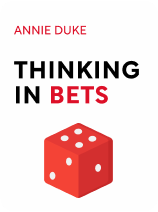

This article is an excerpt from the Shortform book guide to "Thinking in Bets" by Annie Duke. Shortform has the world's best summaries and analyses of books you should be reading.
Like this article? Sign up for a free trial here .
What is the Reproducibility Project? How does it illustrate decision-making under risk?
We don’t always think in terms of risk, and maybe that’s why we’re prone to making irrational decisions. But what if we worked on keeping risk at the forefront of our minds? That’s what Thinking in Bets is all about. Author Annie Duke uses the Reproducibility Project as an example of decision-making under risk, showing how thinking in bets can produce more effective decisions.
Keep reading to learn about decision-making under risk.
Decision-Making Under Risk
Every decision, no matter how big or small, carries risk.
We don’t always think in terms of risk, and maybe that’s why we’re prone to making decisions in irrational ways:
- Being impulsive, or not thinking our decisions through
- Making the easy choice, or the choice that feels good in the moment, even if it’s not good for us in the long run
- Letting our biases influence our decisions
But what if we worked on keeping risk at the forefront of our minds when we made decisions? One way to practice effective decision-making under risk is by thinking of every decision as a bet.
In a bet, you know that even if the odds are in your favor, there’s a chance you could lose. Betting means knowing you don’t have all the information; you have to use your best judgment in the face of risk and uncertainty.
Decision-making under risk is the same; you weigh the odds and hope for the best outcome.
The Reproducibility Project
Psychology is an example of decision-making under risk. It was a study that showed how thinking in bets can produce more effective decisions.
The team behind the Reproducibility Project asked scientists to bet on the likelihood that the results of an experiment could be replicated. They provided those scientists money to use in a betting market, and then they attempted to recreate some of the studies (and the results produced) found in top psychology journals.
When betting, those scientists were right 71% of the time about whether or not the replicated experiments would produce the same result, in comparison to the 58% accuracy found when experts gave their opinions via peer review. The discrepancy can be chalked up to the fact that even scientists can fall prey to resulting and motivated reasoning, and they can be biased against or in favor of a study depending on whether they are ideologically aligned with its findings. By betting, they were forced to be more critical and more objective.
It’s not that those scientists who participated in the Reproducibility Project cared more because money was at stake; it’s that the project highlighted the risk involved in getting something wrong. There is always risk in peer review—risk to the reviewers’ reputations, as well as the risk of accidentally spreading false information that could affect policy decisions and, ultimately, people’s lives. The Reproducibility Project just put that risk at the front of their minds, and it serves as an interesting example of decision-making under risk.

———End of Preview———
Like what you just read? Read the rest of the world's best book summary and analysis of Annie Duke's "Thinking in Bets" at Shortform .
Here's what you'll find in our full Thinking in Bets summary :
- How to get better at making good decisions
- How to work around your biases
- How to evaluate and learn from your past






